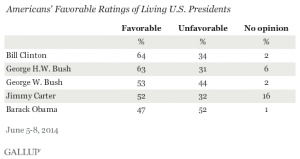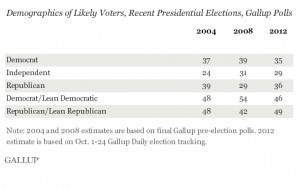They do it fairly subtly, too: “U.S. registered voters are about as likely to say they would vote for the Democratic congressional candidate in their district if the election were held today as to say they would vote for the Republican candidate, 47% to 46%.” Now, I know what you’re thinking: you’re thinking But Moe, the Democrats are ahead by a point! Yup!
They’re ahead on a poll of registered voters. Which, as Gallup itself concedes, “when Gallup has found congressional voting preferences close to even among registered voters, that is typically a better sign for the Republican Party, given usual Republican advantages in voter turnout.” But let’s pretend for a moment that the above is a likely voter pool. Gallup is touting the accuracy of its generic balloting in Congressional elections, so let’s take a look at these numbers for a second:
| Year |
Gallup |
Election |
+/- |
| 2010 |
16 |
8 |
63 |
| 2006 |
-8 |
-8 |
-30 |
| 2002 |
6 |
4 |
7 |
| 1998 |
-4 |
0 |
-5 |
| 1994 |
8 |
8 |
54 |
| 1990 |
-8 |
-10 |
-8 |
Those are the off-year Presidential election results, back to 1990 (data is spotty past that point). ‘Gallup’ is the difference in the Republican & Democratic vote in their final survey; ‘election’ is the final spread in the two-party vote; …and ‘+/-‘ shows how many seats the Republicans actually gained or lost in that time period*. As is fairly obvious: when the Republicans do great on the generic Congressional ballot they do fantastic. When the Democrats do great on the generic they do… well, not all that great, but reasonably well. And when the numbers are about the same (which? …Nothing much happens. Now, at this point a bunch of readers have probably forgotten about 2008, which was not an off-year Presidential election; but I did not. There was a complication with regard to the fact that the 2012 has not yet switched to a likely voter model, but fortunately in 2008 Gallup reported both likely and registered voters, so we can look at the way things went:
| Oct |
Final |
Election |
+/- |
| -7 |
-8 |
-12 |
-21 |
‘Oct’ is the October 17, 2008 survey (44/51); ‘Final’ is the November 2, 2008 one (43/51). As you can see there, it turns out that the significant gain of seats more or less reflects the distance between the Democrats and the Republicans at that point. And that is why Gallup’s tie in the generic Congressional ballot doesn’t worry me; it’s essentially telling me that there won’t be much of a shift, if any. Looking at 1998, which was the last time we had the first election after a dramatic flipping of the House to Republican hands… I could totally see the GOP losing five net seats this year. Possibly even ten.
… And? Right now there are 240 Republicans in Congress, and 190 Democrats (5 vacant seats). Even assuming we lose every vacant seat election and another 10 besides, the 113th Congress will start with a 230/205 Republican/Democratic majority. I don’t particularly want to lose those seats, of course; but we will still have a working majority. Which is pretty much what everybody is expecting, even if they don’t particularly want to say so in public.
Moe Lane
PS: If you’re wondering why I’m not taking into account Barack Obama’s coat-tails, oh, that’s easy: I don’t think that he’ll have any. Largely by Barack Obama’s own conscious choice.
*Gallup did not provide that information; I pulled it from Wikipedia.


